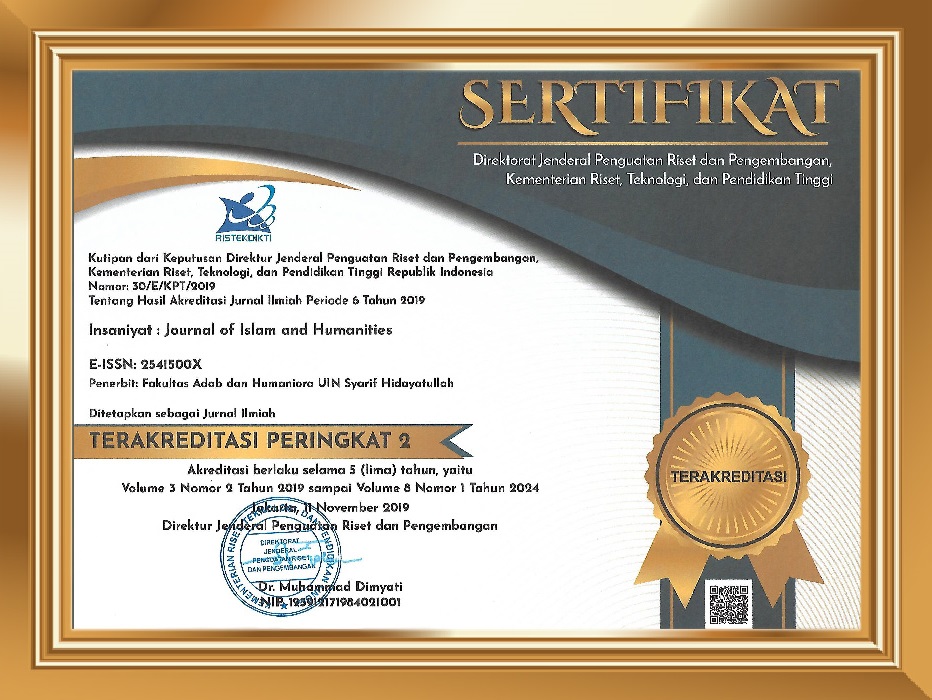The Efforts of the National Library of Indonesia in Providing Covid-19 Reliable Resources through Coronapedia
Abstract
Keywords
References
Abdullah, S. M. (2019). Social Cognitive Theory : A Bandura Thought Review published in 1982-2012. Psikodimensia, 18(1), 85. https://doi.org/10.24167/psidim.v18i1.1708
Akhirfiarta, B. T. (2017). Literasi Digital pada Pegawai RSUD dr. Soetomo Surabaya Brilian Trofi Akhirfiarta 1 071311633083. Journal.Unair.Ac.Id. http://journal.unair.ac.id/ download-fullpapers-lna3e16b8d81full.pdf
Atmadi, G., & Widati, S. R. W. (2013). Strategi Pemilihan Media Komunikasi LPPOM MUI Dalam Sosialisasi & Promosi Produk Halal Di Indonesia. Jurnal Al-Azhar Indonesia Seri Pranata Sosial, 2(2), 87–97. https://jurnal.uai.ac.id/index.php/SPS/article/ viewFile/150/140
Azwar, M., & Sulthonah, S. (2018). The Utilization of Instagram as a Media Promotion : The Case Study of Library in Indonesia. Insyaniat: Journal of Islam and Humanities, 2(2), 147–159. https://journal.uinjkt.ac.id/index.php/insaniyat/article/view/7320/pdf
Bandura, A. (2001). Social Cognitive Theory of Mass Communication. Media Psychology, 3(3), 265–299. https://doi.org/10.1207/S1532785XMEP0303_03
Hak, A. A. (2019). An analysis of integrated e-literacy model on prophetic-humanization communication behavior. In Laksmi, R. Sugihartati, T. A. Salim, N. Mayesti, Y. Sumaryanto, Rahmi, W. Suwarno, F. Elnumeri, M. A. Rachman, & Endang Wahyulestari (Eds.), Kajian dalam bidang Ilmu Perpustakaan dan Informasi: filosofi, teori dan praktik (pp. 355–463). ISIPII.
Hak, A. A. (2021). Effect of e-Literacy Maturity Level on Lecturers’ Information Use Behavior at Islamic University, Indonesia. Library Philosophy and Practice, 2021, 1–18. https://digitalcommons.unl.edu/libphilprac/4975/
Hak, A. A., Rachmawati, T. S., Rusmana, A., & Muhtadi, A. S. (2018). Using Electronic Media and the Problem of Prophetic Communication Behavior at UIN Syarif Hidayatullah Jakarta. 154(Icclas 2017), 55–58. https://doi.org/doi:10.2991/icclas-17.2018.14
Hak, A. A., Rianti, F., Irfaniah, H., Hamdani, F., Wenny, L. S., & Hidayat, P. (2021). The Impact of Information Literacy on Prophetic Communication Behavior through Using Information on Electronic Media. International Conference on Cyber and IT Service Management (CITSM), 1–7. 10.1109/CITSM52892.2021.9588927
Indonesia., A. P. J. I. (2019). Survei APJII yang Ditunggu-tunggu, Penetrasi Internet Indonesia 2018. https://apjii.or.id/content/read/39/410/Hasil-Survei-Penetrasi-danPerilaku-Pengguna-Internet-Indonesia-2018
Larose, R., & Eastin, M. S. (2004). A Social Cognitive Theory of Internet Uses and Gratifications : Toward a New Model of Media Attendance. Broadcasting & Electronic Media, October, 358–377. https://doi.org/10.1207/s15506878jobem4803
Lee, J. J., Kang, K. A., Wang, M. P., Zhao, S. Z., Wong, J. Y. H., O’Connor, S., Yang, S. C., & Shin, S. (2020). Associations between COVID-19 misinformation exposure and belief with COVID-19 knowledge and preventive behaviors: cross-sectional online study. Journal of Medical Internet Research, 22(11), 1–13. https://doi.org/10.2196/22205
Liansari, V., & Nuroh, E. Z. (2018). Realitas Penerapan Literasi Digital bagi Mahasiswa FKIP Universitas Muhammadiyah Sidoarjo. Proceedings of The ICECRS, 1(3), 241– 252. https://doi.org/10.21070/picecrs.v1i3.1397
Maddux, J. E. (1995). Self-efficacy, adaptation, and adjustment: Theory, research, and application. https://doi.org/10.1007/978-1-4419-6868-5
Mardiyanto, V. (2018). Opini dan Analisis Program Layanan Informasi di Perpustakaan dengan Metode Jarak Jauh (Studi Kasus Layanan Informasi Menggunakan Aplikasi Imobile Ipusnas). Tik Ilmeu : Jurnal Ilmu Perpustakaan Dan Informasi, 2(1), 1. https://doi.org/10.29240/tik.v2i1.396
Ningtyas, I. (2021). Indonesia battles spread of vaccine misinformation. Anadolu Agency. https://www.aa.com.tr/en/asia-pacific/indonesia-battles-spread-of-vaccinemisinformation/2124319
Perpustakaan Nasional RI. (2021). Bimbingan Pemustaka dan Literasi Informasi. Pusat Jasa Informasi Perpustakaan Dan Pengelolaan Naskah Nusantara Perpustakaan Nasional Republik Indonesia. Perpustakaan Nasional RI. http://pujasintara.perpusnas. go.id/bimbingan-pemustaka/#1622872175247-76764f08-cec3
Pratiwi, I., Salikah, A. N., Lestari, F. E., & Apriyanti, I. (2009). Kajian Dampak Media: Social Cognitive Theory. Komunukasi Massa Fisip UI.
Puspita, G. A., & Irwansyah. (2018). Indonesia: Studi Kasus Pembaca E-Book Melalui Aplikasi iPusnas. Bibliotika: Jurnal Kajian Perpustakaan Dan Informasi, 2(1), 13– 20. http://journal2.um.ac.id/index.php/bibliotika/article/view/4164/2289
Putri, L., & Rafly, R. F. (2021). Battling Against COVID-19 Infodemic in Indonesia: A Sociocybernetics Perspective. Journal of Asian Social Science Research, 3(2), 125– 142. https://doi.org/10.15575/jassr.v3i2.41
Siregar Ninny Hj., & Munthe Sirmas. (2019). Analisa Perawatan Mesin Digester dengan Metode Reliabity Centered Maintenance pada PTPN II Pagar Merbau. Jime (Journal of Industrial and Manufacture Engineering), 3(2), 89. http://ojs.uma.ac.id/index. php/jime
Subarjo, A. H. (2017). Perkembangan Teknologi Dan Pentingnya Literasi Informasi Untuk Mendukung Ketahanan Nasional. Angkasa: Jurnal Ilmiah Bidang Teknologi, 9(2), 1. https://doi.org/10.28989/angkasa.v9i2.188
Sunda, Uj. (2020). Kepala Perpusnas: Generasi Milenial Perlu Pahami Literasi Digita. Peprustakaan Nasional RI. https://www.perpusnas.go.id/news-detail. php?lang=id&id=2007290251551L23HZxJRY
Suwartini, S. (2016). Teori Kepribadian Social Cognitive : Kajian Pemikiran Albert Bandura. Al-Tazkiah: Jurnal Bimbingan Dan Konseling Islam, 5(1), 37–46. https://journal. uinmataram.ac.id/index.php/altazkiah/article/view/1325
Unonongo, W., Warouw, D., & Tulung, L. (2015). Fungsi Promosi Dalam Meningkatkan Daya Beli Gadget Samsung Di Kota Manado. E-Journal Acta Diurna, 4(5), 1–12. https:// www.neliti.com/id/publications/92615/fungsi-promosi-dalam-meningkatkan-dayabeli-gadget-samsung-di-kota-manado
DOI: 10.15408/insaniyat.v7i1.27536
Refbacks
- There are currently no refbacks.






